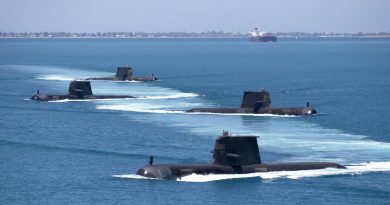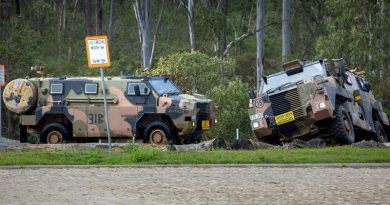Soldier wins 24hr marathon – runs 215km

Consolation for second place in the 40-hour Birdy’s Backyard ultramarathon in August came when Private Philip Gore won the Lighthorse Ultra 24-hour Marathon on September 13.
CAPTION: Private Philip Gore in action during the Lighthorse Ultra 24-hour Marathon. Story by Corporal Julia Whitwell.
Private Gore dropped out of Birdy’s after 39 laps of a 6.71km track around Lake Towerrinning, WA.
Each lap started on the hour, the winner needing one more lap than their competitor to consolidate the win.
“He was trying to shake me for a while. It was just the two of us running for the last eight or nine laps,” Private Gore said.
“He was still looking pretty strong but you don’t know what’s going on behind the scenes.”
Private Gore said Birdy’s began at 10am on a Friday morning and finished before 2am on the Sunday.
“I was determined to push for that last lap. Completing 39 at 1am meant I had run over three days,” he said.
“I wasn’t expecting to finish anywhere near the top. I just wanted to see how far I could physically go. As long as I got to finish a lap within the hour, I’d start the next.”
The run came with many struggles as Private Gore hurt his ankle on lap 34 and almost collapsed at the start of lap 38, but managed to push through.
“I thought I had to pull out. I finished lap 39 with a minute and a half to spare. A few steps into the next, I couldn’t go any more,” he said.
The race was Private Gore’s second ultramarathon, after six years of focusing on shorter events.
“I used to do 5km a day, then that leads into a half marathon, which leads to a full marathon. Before you know it, a marathon doesn’t cut it anymore,” Private Gore said.
“You keep pushing to that next level. I was running between 110-140km a week leading up to the event with lots of hill work and speed training.
“That only gets you so far, then the rest is mental.”
Private Gore said he ran 215.11km in the Lighthorse Ultra 24-hour Marathon.
“I was really stoked to win the 24-hour. The guy who beat me in Birdy’s pulled out after 14 hours. He went out too fast,” Private Gore said.
“Part of my strategy was to sit back and go at my own pace.
“I could take walking breaks and talk to other people. Whether they were laps ahead, or 20 laps behind you, it didn’t matter,” he said.
“We started at 6pm, so when the 12, six, and three-hour participants started at dawn the next morning, it improved my pace because they were all fresh and running a shorter distance.”
Private Gore credited his support crew with his success.
“My wife was my crew,” he said.
“She looked after my hydration and nutrition, let me know when I had to push harder or ease off and kept an eye on the other people in the race to see if they were catching up.
“All I had to think about was to keep moving.”
.
.
.
.
.
.

.
.





